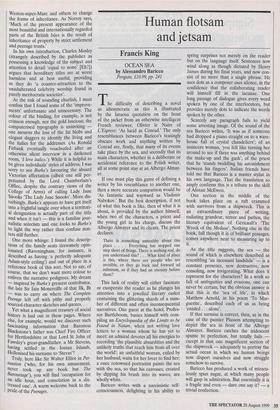Human flotsam and jetsam
Francis King
OCEAN SEA by Alessandro Baricco
Penguin, 110.99, pp. 241
The difficulty of describing a novel as idiosyncratic as this is illustrated by the fatuous quotation on the front of the jacket from an otherwise intelligent French reviewer, Olivier le Naire of L'Express: 'As lucid as Conrad.' The only resemblances between Baricco's teasingly obscure work and anything written by Conrad are, firstly, that many of its events take place by the sea, and secondly that its main characters, whether in a deliberate or accidental reference to the Polish writer, all at some point stay at an Albergo Almay- er.
If one must play this game of defining a writer by his resemblance to another one, then a more accurate comparison would be `As fantastic and wayward as Vladimir Nabokov.' But the best description, if not of what this book is like, then of what it is about, is provided by the author himself, when two of the characters, a priest and the young girl in his charge, discuss the Albergo Almayer and its clients. The priest declares:
There is something unhealthy about this
place . . Everything has stopped one step short of things, There is nothing real, do you understand this? . . What kind of place is this, where there are people who are invisible, or they go back and forward ad infinitum, as if they had an eternity before them?
This lack of reality will either fascinate or exasperate the reader as he plunges his attention into a jewelled literary casket containing the glittering shards of a num- ber of different and often inconsequential narratives. One guest at the hotel, Profes- sor Bartleboom, busies himself with com- piling an Encyclopaedia of the Limits to be Found in Nature, when not writing love letters to a woman whom he has yet to meet; an admiral devotes all his energies to recording 'the plausible absurdities and the unlikely truths that reach him from all over the world'; an unfaithful woman, exiled by her husband, waits for her lover to find her; a once renowned portraitist paints the sea with the sea, so that his canvases, created by dipping his brush into its waves, are wholly white.
Baricco writes with a narcissistic self- consciousness, delighting in his ability to spring surprises not merely on the reader but on the language itself. Sentences now wind along as though dictated by Henry James during his final years, and now con- sist of no more than a single phrase. He uses dots as a composer uses silence, in the confidence that the collaborating reader will himself fill in the lacunae. One long passage of dialogue gives every word spoken by one of the interlocutors, but provides merely dots to indicate the words spoken by the other.
Scarcely any paragraph fails to yield some arresting image. Of the sound of the sea Baricco writes, 'It was as if someone had dropped a piano straight on to a ware- house full of crystal chandeliers'; of an insincere woman, 'you felt like turning her around to see if there was anything behind the make-up and the gush'; of the priest that he 'stands twiddling his astonishment between his fingers'. Italian friends have told me that Baricco is a master stylist in his own language. That the translation so amply confirms this is a tribute to the skill of Alistair McEwen.
One section in the middle of the book takes place on a raft crammed with survivors from a shipwreck. This is an extraordinary piece of writing, radiating grandeur, terror and pathos, the literary equivalent of Gericault's 'The Wreck of the Medusa'. Nothing else in the book, full though it is of brilliant passages, comes anywhere near to measuring up to it.
As the title suggests, the sea — the sound of which is elsewhere described as resembling 'an incessant landslide' — is a constant presence, now destructive, now consoling, now invigorating. What does it represent for the characters? In a work so full of ambiguities and evasions, one can never be certain, but the obvious answer is that this is the 'sea of life', in which Matthew Arnold, in his poem 'To Mar- guerite', described each of us as being `enisled . alone'.
If that surmise is correct, then, as in the case of the painter Plasson attempting to depict the sea in front of the Albergo Almayer, Baricco catches the iridescent spume to perfection, but totally fails — except in that one magnificent section of the shipwreck — adequately to portray the actual ocean in which we human beings now disport ourselves and now struggle somehow to survive.
Baricco has produced a work of miracu- lously spun sugar, at which many people will gasp in admiration. But essentially it is a fragile and even — dare one say it? — a trivial confection.


























































 Previous page
Previous page